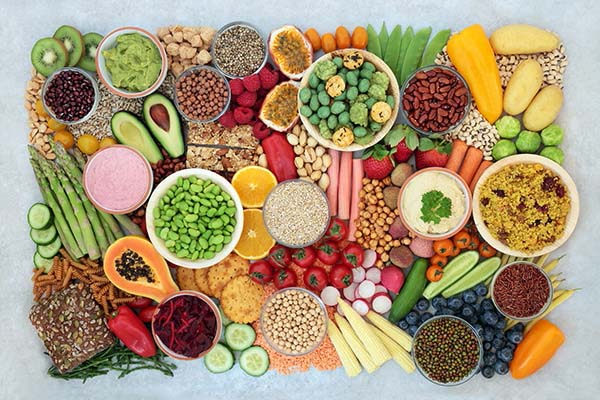A Beginner’s Guide to Cooking With Plant Based Chicken at Home
Everything About Healthy And Balanced Food: Advantages of Checking Out Plant Based Alternatives
The conversation surrounding plant-based diets has gained substantial focus over the last few years. Lots of people are checking out the potential wellness advantages, nutritional advantages, and ecological influences connected with these dietary choices. As individuals end up being more knowledgeable about their food's impact on wellness and sustainability, questions emerge concerning the functionalities of adopting such a way of living. What certain changes can one anticipate, and exactly how might these choices improve not just personal wellness but additionally the planet's future?
Comprehending Plant-Based Diets
Numerous individuals associate plant-based diet regimens mainly with vegetarianism or veganism, these diet regimens can encompass a large range of consuming patterns that focus on whole, minimally refined plant foods. Such diets usually include fruits, veggies, entire grains, seeds, beans, and nuts, while removing or restricting pet items. This versatility enables people to customize their nutritional options according to dietary requirements and personal preferences. Some may adopt a primarily plant-based diet while still occasionally consuming meat or dairy products, typically described as a flexitarian approach. The focus remains on incorporating even more plant foods, which can result in a varied variety of dishes and flavors. Recognizing these various interpretations of plant-based eating is essential for valuing its access and appeal in modern food society.
Wellness Advantages of Plant-Based Foods
The wellness advantages of plant-based foods are significant, supplying a nutrient thickness advantage that sustains total wellness. Research indicates that these foods can improve heart health and wellness and play a crucial role in efficient weight management. By incorporating much more plant-based alternatives, individuals may improve their nutritional choices and promote lasting health.
Nutrient Density Advantage
Nutrient density plays a necessary duty in the health and wellness benefits of plant-based foods, making them an engaging selection for those seeking a balanced diet regimen. Plant-based foods, such as fruits, veggies, beans, nuts, and entire grains, are usually abundant in important vitamins, minerals, and antioxidants while being reduced in calories. This high nutrient thickness allows individuals to eat less calories while still meeting their nutritional needs. Furthermore, these foods are packed with dietary fiber, promoting gastrointestinal health and aiding in weight monitoring. By integrating nutrient-dense plant-based options, customers can improve their overall wellness, sustain their body immune systems, and minimize the risk of persistent illness. Ultimately, the nutrient thickness of plant-based foods highlights their importance in a health-conscious way of living.
Heart Health Renovation

Weight Monitoring Support
In addition to advertising heart health, a plant-based diet plan can significantly aid in weight monitoring. This dietary technique emphasizes entire foods such as fruits, veggies, beans, nuts, and whole grains, which are usually reduced in calories and greater in fiber contrasted to animal-based items. The high fiber content assists boost satiety, lowering overall calorie intake. Plant-based diets are commonly rich in crucial nutrients while low in undesirable fats, making it simpler to keep a healthy weight. Research suggests that people that embrace a plant-based lifestyle have a tendency to have reduced body mass indexes (BMIs) and experience more effective fat burning contrasted to those who consume meat-heavy diet plans. Welcoming plant-based choices is a tactical selection for effective weight monitoring.
Nutritional Value of Plant-Based Components
Plant-based components are abundant in important nutrients, offering a varied range of vitamins, minerals, and antioxidants that add to general wellness. A comparison of protein resources reveals that while pet items are commonly deemed exceptional, lots of plant-based choices offer appropriate healthy protein and various other useful substances. Understanding the nutritional value of these ingredients can aid people make informed nutritional choices.
Vital Nutrients in Plants
Nutrient-rich active ingredients discovered in plants provide a varied selection of crucial vitamins and minerals that contribute considerably to general health. These ingredients are rich in vitamins A, C, and K, which sustain immune function, vision, and blood clotting, specifically. Additionally, plants give important minerals such as magnesium, potassium, and calcium, essential for heart health, muscle mass function, and bone strength. The existence of fiber in plant-based foods help food digestion and advertises a healthy digestive tract microbiome. Antioxidants, located perfectly in vegetables and fruits, help combat oxidative tension and decrease inflammation. Many plant foods are low in calories yet high in nutrients, making them an outstanding choice for those seeking to preserve a healthy and balanced weight while guaranteeing excellent nutrient intake.

Comparing Protein Resources
Protein sources differ significantly in their dietary accounts, with plant-based components using distinct benefits. Unlike pet proteins, which typically consist of saturated fats and cholesterol, plant proteins have a tendency to be reduced in these undesirable parts. Legumes, nuts, seeds, and entire grains are abundant in necessary amino acids, fiber, vitamins, and minerals. Lentils provide high healthy protein content alongside substantial iron and folate, while quinoa is a complete protein, providing all 9 necessary amino acids. In addition, plant-based healthy proteins are typically come with by anti-oxidants and phytochemicals that sustain overall wellness. The shift to plant-based healthy protein sources not just enhances dietary consumption however also straightens with lasting dietary techniques, reducing environmental influence and promoting lasting wellness advantages.
Environmental Impact of Plant-Based Eating
As understanding of climate change grows, several people are discovering lasting dietary options that can greatly lessen their ecological footprint. Plant-based eating has actually emerged as a considerable contributor to minimizing greenhouse gas discharges, which are primarily connected with animals manufacturing. The cultivation of fruits, vegetables, grains, and vegetables commonly requires fewer resources, such as water and land, contrasted to pet farming. Additionally, plant-based diet regimens can lead to lowered logging, as less land check that is required for grazing animals or expanding pet feed. By changing in the direction of plant-based alternatives, consumers can support biodiversity and advertise much healthier environments. On the whole, embracing plant-based consuming not just benefits individual health and wellness but also represents a crucial step toward ecological sustainability and conservation initiatives.
Conquering Common Misconceptions
While numerous individuals recognize the benefits of a plant-based diet, a number of misunderstandings commonly deter them from fully accepting this way of living. A typical idea is that plant-based diet plans do not have enough protein; nevertheless, numerous plant sources, such as beans, nuts, and tofu, provide enough protein. Additionally, some assume that this diet regimen is expensive, when actually, staples like beans, rice, and seasonal veggies can be rather economical. One more misconception is that plant-based eating is extremely limiting, whereas it actually offers a varied array of foods and flavors. Lastly, several fret that a plant-based diet regimen might bring about deficiencies, yet with appropriate planning, people can get all necessary nutrients, consisting of minerals and vitamins, while appreciating a wide range of delicious dishes.
Tips for Transitioning to a Plant-Based Way of life
Making the change to a plant-based lifestyle can be an improving experience, though it typically calls for some assistance to navigate the preliminary adjustments. First, people are encouraged to start slowly, including more fruits, vegetables, beans, and whole grains into their dishes while lowering meat and dairy usage. Dish preparation is essential; preparing a regular menu can assist reduce the change and avoid last-minute undesirable options. Discovering brand-new recipes and cooking approaches can also preserve and improve the experience enjoyment regarding plant-based eating. Furthermore, signing up with support system or neighborhoods can supply inspiration and share useful pointers. Ultimately, remaining educated regarding nourishment assurances balanced meals, avoiding deficiencies while fostering a healthy and balanced, satisfying plant-based way of living.
Delicious Plant-Based Dish Ideas
Checking out scrumptious plant-based meal ideas can influence people to embrace a much more nourishing diet regimen. One popular choice is a passionate quinoa salad, including cherry tomatoes, cucumber, and a zesty lemon-tahini dressing. One more fave is a savory lentil stew, packed with carrots, celery, and aromatic natural herbs, ideal for a soothing supper. For morning meal, over night oats made with almond milk, chia seeds, and topped with fresh berries provide a healthy begin to the day. In addition, a vivid veggie stir-fry with tofu and a variety of colorful veggies can be a quick yet satisfying meal. Creamy avocado toast on whole-grain bread, sprinkled with spices and seeds, provides an easy yet tasty snack. These meals showcase the variety and richness of plant-based consuming.

Regularly Asked Concerns
Can a Plant-Based Diet Give Sufficient Protein?
The inquiry of whether a plant-based diet can give adequate healthy protein is typical. Numerous resources, including beans, nuts, seeds, and whole grains, can satisfy healthy protein needs successfully, supporting a balanced and healthy diet regimen for people.
Are Plant-Based Diet Regimens Suitable for Kid?
The suitability of plant-based diet regimens for kids depends on mindful planning. Appropriate nutrients should be ensured, consisting of vitamins, proteins, and minerals. With proper advice, such diets can sustain healthy and balanced growth and advancement in youngsters.
How Do I Eat in restaurants on a Plant-Based Diet regimen?
Eating in restaurants on a plant-based diet plan entails seeking restaurants with diverse food selections, asking for modifications, and checking out vegan-friendly alternatives. Planning ahead and interacting nutritional preferences can improve the eating experience while keeping nutritional choices.
What Are Typical Irritants in Plant-Based Foods?
Usual irritants in plant-based foods consist of soy, gluten, nuts, and seeds - Gluten Free BBQ Sauce. People following a plant-based diet ought to understand these irritants and review tags meticulously to avoid adverse reactions and guarantee risk-free usage
Can Plant-Based Diets Assist With Weight Management?
Study shows that taking on a plant-based diet regimen might promote weight loss due to its generally lower calorie density and greater fiber web content. This mix can improve satiation, assisting individuals manage their calorie consumption properly. Lots of individuals connect plant-based diet plans primarily with vegetarianism or veganism, these diets can incorporate a vast array of eating patterns that prioritize entire, minimally refined plant foods. Nutrient thickness Find Out More plays a vital function in the health benefits of plant-based foods, making them a compelling option for those seeking a well balanced diet. Plant-based diet regimens have been revealed to significantly improve heart health and wellness, as they often consist of elements that support cardiovascular feature. In addition to promoting heart wellness, you can try this out a plant-based diet plan can considerably assist in weight administration. A common idea is that plant-based diets do not have adequate healthy protein; nevertheless, numerous plant resources, such as beans, nuts, and tofu, provide enough protein.